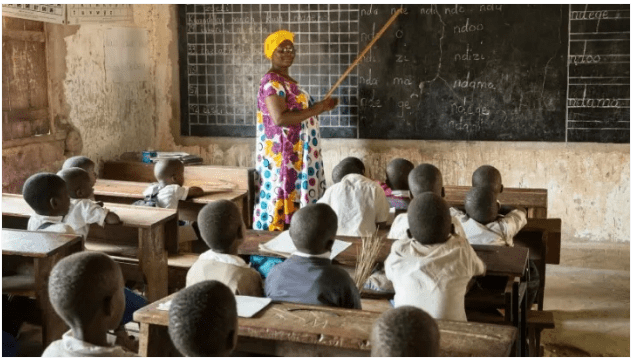Educational Issues
Education Amidst The COVID-19 Pandemic: Possibilities And The Way Forward -By Patience Daberechi Ogbu
The education sector and curriculum of all school levels should be x-rayed by the Minister of Education, public and private stakeholders. This will afford the opportunity to identify loopholes that exist and adjust the system to deliver efficiently. This could be done via the introduction of digitally-inclined courses.

Introduction
In the history of human existence and global civilization, there has not been a more challenging period for universal fortes sectors as the time of global crisis. Statistics as well as research bring to light that global emergencies including in the health sector have contributed to an ironic transformation of diverse areas of human living. Spanning from business lines, to international market structures, tourism, equally, education.
On the 11th of December, 2019, history experienced the sweeping of an infectious disease, the Corona Virus, otherwise known as, COVID-19. According to the World Health Organization (WHO) the virus belongs a family of viruses that cause illnesses ranging from the common cold to more severe diseases such as Severe Acute Respiratory Syndrome (SARS) and the Middle East Respiratory Syndrome (MERS).
Contextualization of Terms
Hit by such catastrophic event, has aroused global concern. It is the world against a mixed affair of doubts, possibilities, and challenges. Education according to the English Dictionary is “the process or art of imparting knowledge, skill and judgement. In the context of this essay, the definition by the Merriam Webster Dictionary will be adopted. The definition is given thus as “the knowledge, skill, and understanding a person gets from attending a school, college, or university”.

The New Order
Indeed, the COVID-19 pandemic has struck hard. However, while some countries embrace the new normal, setting efforts to tackle the novel disease whilst taking measures to improve vital areas of nation growth, others spectacle the new-fangled world order.
Across international borders and local walls, physical educational activities became jeopardized because of travel and stay at home restrictions, national and international halt of economic activities, as well as the closure of schools, amongst other strategies set in place by the World Health Organization (WHO) and country disease regulatory bodies as in the case of Nigeria, the Nigeria Centre for Disease Control (NCDC) to curtail the spread of the corona virus disease. Although, these measures see to the protection of citizens against contraction of the disease, it threatens their livelihood.
Expectedly, with the shutdown of schools across the world, millions of students have had to think out and adapt to new, innovative, and creative and ways of growing their knowledge volume. This is in fact an upgrade. However, these new modalities appear to be fraught with the potential for peril as well as the prospect of success to the future of the educational sector. the present situation brought to the open the already frail and struggling educational system and institutions. According to the World Economic Forum, “the COVID-19 has exposed the education divide in Nigeria”. It is important to note that this development has helped countries which may not have satisfactorily incorporated technology in their educational structures, such as Nigeria to discover lapses in the system, adapt to and adopt more digitally-inclined means of learning, and hopefully take action steps to rebuild the cracks in the wall lest it collapses.
Also, taking a positive look at the situation, it is quite revealing that the period has served as and afforded students opportunities for growth and self-development. With introduction to virtual learning environments, students have been able to access, take and be certified in various courses online, unearth, learn and develop skills and innovate better ways of human living. Therefore, it has awakened the persistent spirit of students, thus raising young people to be independent and problem solvers.
Notable challenges
However, though the introduction of technology in the education sector as a result of the COVID-19 pandemic has brought about lots of good, it is not without hard struggle. While digital technology has become a paramount factor in the education sector, certain challenges as shortage or in most cases zero electricity supply, high cost and consumption of data, inability for students within rural communities and of low-income families can be left behind as a result of incapability to blend in the transition. According to United Nations Educational, Scientific and Cultural Organization (UNESCO), “89% of students in sub-Saharan African countries do not have access to household computers and 82% lack internet access”. Low level of tech-know-how and lack of training of students, likewise instructors, fears of losing jobs by educators, etc., places limits to the full utilization of the benefits it offers.
Possible Solutions
Notwithstanding notable challenges in the education system, possible solutions to help salvage the situation are within reach. The education sector and curriculum of all school levels should be x-rayed by the Minister of Education, public and private stakeholders. This will afford the opportunity to identify loopholes that exist and adjust the system to deliver efficiently. This could be done via the introduction of digitally-inclined courses. In addition, electricity should be provided constantly for citizens and its cost low so as to be affordable by the citizenry, especially students.
Correspondingly, to the aforementioned, installation of solar panels across states and rural communities for the generation of power would go a long mile to bridge the gap. According to the World Economic Forum in 2020, “Governmental reforms in the national curriculum would help bridge the gap in inequality”.
Also, like countries like India, data should be unlimited and accessible for citizens at all time. Furthermore, instructors and students as well should be properly equipped with technical knowledge through timely and constant workshops and seminars.
Conclusion
In conclusion, saving education is one way to save the future. Therefore, adequate steps such as those enumerated above would be vital to bridge already existing education gaps and prepare countries like Nigeria for any future uncertainty. Thereby strengthening education systems and building a productive country.
The writer is a Law student of the University of Nigeria, Nsukka.
She can be reached through email, daberechiogbu@gmail.com or via LinkedIn https://www.linkedin.com/in/daberechi-ogbu-0738aa189




















